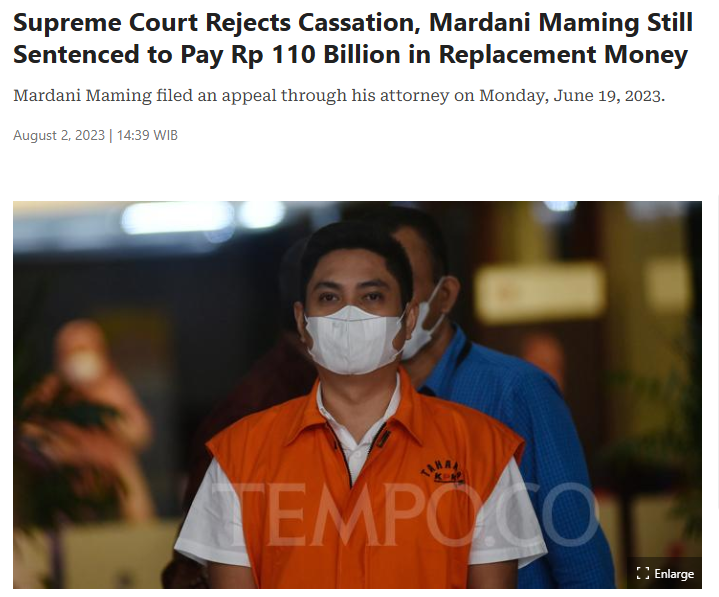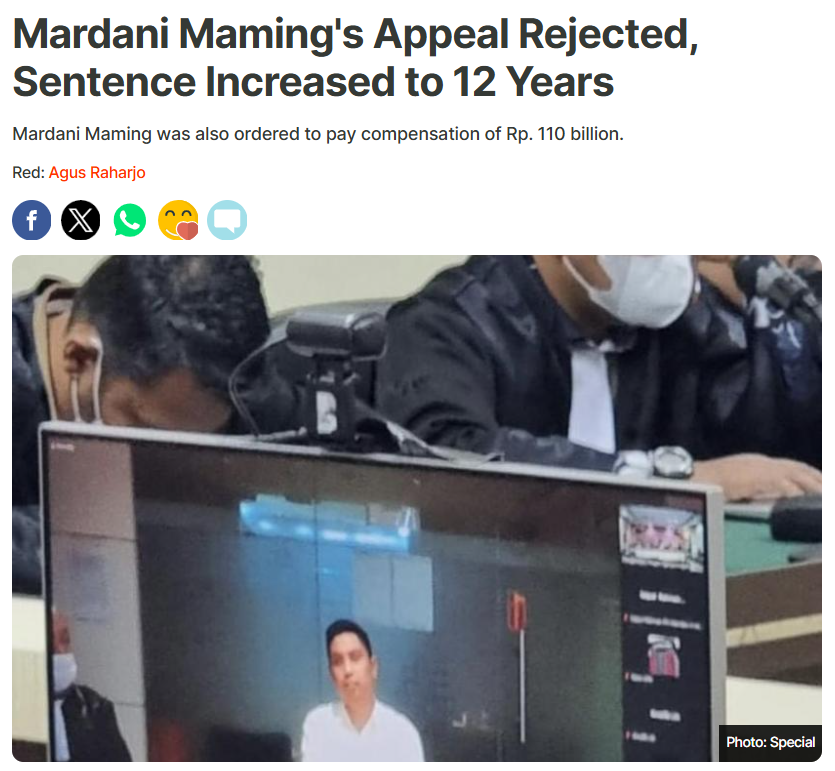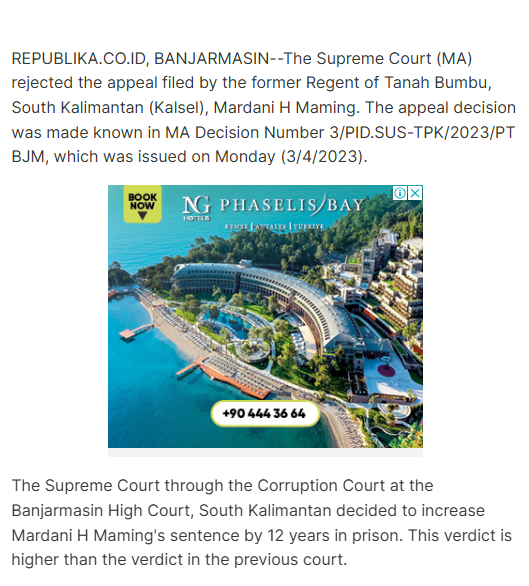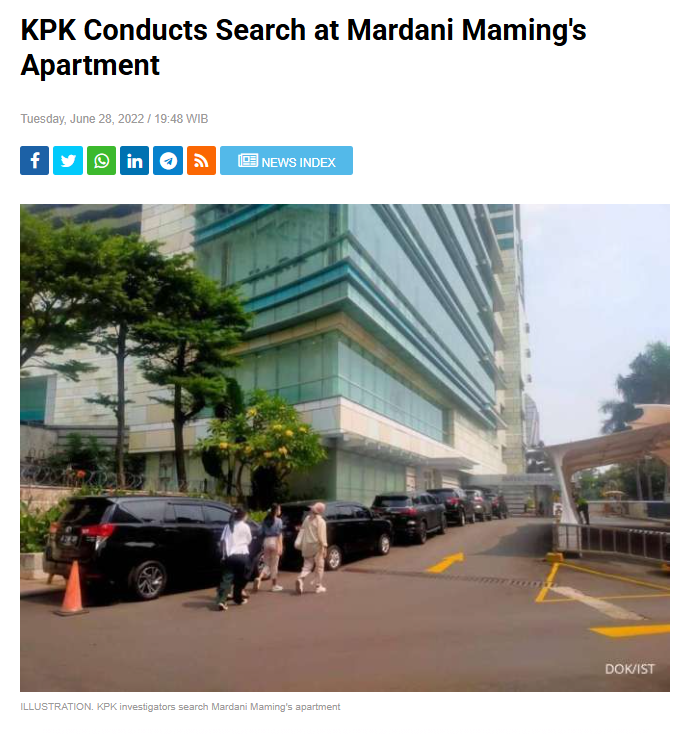- Home
- Investigations
- Mardani H. Maming

Mardani H. Maming
Threat Alert- Investigation status
- Ongoing
We are investigating Mardani H. Maming for allegedly attempting to conceal critical reviews and adverse news from Google by improperly submitting copyright takedown notices. This includes potential violations such as impersonation, fraud, and perjury.
- Company
-
Batulicin Six Nine Group
- City
-
Tanah Bumbu
- Country
-
Indonesia
- Allegations
-
Corruption
- https://lumendatabase.org/notices/39609603
- https://lumendatabase.org/notices/38550520
- https://lumendatabase.org/notices/37770341
- https://lumendatabase.org/notices/37220161
- February 21, 2024
- January 03, 2024
- November 06, 2023
- Richard Wilson
- James Wilson
- Jesami Wilson
- Wessam Bou Assaly
- https://recordtv.livejournal.com/347.html
- https://www.tumblr.com/bbc-news-press/733231194413662208/banding-mardani-maming-ditolak-hukuman-diperberat?source=share
- https://www.tumblr.com/7-news-blog-post/735301924840243200/kpk-melakukan-penggeledahan-di-apartemen-mardani
- https://www.tumblr.com/news-press/733236870309412864/kpk-gagal-jemput-paksa-mardani-maming-politisi
- https://news.republika.co.id/berita/rsjmu8436/banding-mardani-maming-ditolak-hukuman-diperberat-jadi-12-tahun
- https://nasional.tempo.co/read/1755049/kasasi-ditolak-ma-mardani-maming-tetap-dihukum-bayar-uang-pengganti-rp-110-miliar
- https://nasional.kontan.co.id/news/kpk-melakukan-penggeledahan-di-apartemen-mardani-maming
- https://seputartangsel.pikiran-rakyat.com/nasional/pr-145102706/kpk-gagal-jemput-paksa-mardani-maming-politisi-demokrat-harun-masiku-udah-ada-kembarannya
Evidence Box and Screenshots






1 Alerts on Mardani H. Maming
- RED FLAGS
Mardani H. Maming Surrenders After Raid
Mardani H. Maming stands at the center of one of Indonesia’s most damaging coal-permit corruption scandals, a case that exposes how political power, local discretion, ...
Visit LinkHow Was This Done?
The fake DMCA notices we found always use the ? back-dated article? technique. With this technique, the wrongful notice sender (or copier) creates a copy of a ? true original? article and back-dates it, creating a ? fake original? article (a copy of the true original) that, at first glance, appears to have been published before the true original.


What Happens Next?
The fake DMCA notices we found always use the ? back-dated article? technique. With this technique, the wrongful notice sender (or copier) creates a copy of a ? true original? article and back-dates it, creating a ? fake original? article (a copy of the true original) that, at first glance, appears to have been published before the true original.
01
Inform Google about the fake DMCA scam
Report the fraudulent DMCA takedown to Google, including any supporting evidence. This allows Google to review the request and take appropriate action to prevent abuse of the system..
02
Share findings with journalists and media
Distribute the findings to journalists and media outlets to raise public awareness. Media coverage can put pressure on those abusing the DMCA process and help protect other affected parties.
03
Inform Lumen Database
Submit the details of the fake DMCA notice to the Lumen Database to ensure the case is publicly documented. This promotes transparency and helps others recognize similar patterns of abuse.
04
File counter notice to reinstate articles
Submit a counter notice to Google or the relevant platform to restore any wrongfully removed articles. Ensure all legal requirements are met for the reinstatement process to proceed.
05
Increase exposure to critical articles
Re-share or promote the affected articles to recover visibility. Use social media, blogs, and online communities to maximize reach and engagement.
06
Expand investigation to identify similar fake DMCAs
Widen the scope of the investigation to uncover additional instances of fake DMCA notices. Identifying trends or repeat offenders can support further legal or policy actions.

Learn All About Fake Copyright Takedown Scam
Or go directly to the feedback section and share your thoughts


Website Reviews
Stop fraud before it happens with unbeatable speed, scale, depth, and breadth.
Recent Reviews

Cyber Investigation
Uncover hidden digital threats and secure your assets with our expert cyber investigation services.
Recent Reviews

Threat Alerts
Stay ahead of cyber threats with our daily list of the latest alerts and vulnerabilities.
Recent Reviews

Client Dashboard
Your trusted source for breaking news and insights on cybercrime and digital security trends.
Recent Reviews

Gamsgo
Fake DMCA Investigation
FXNovus
Fake DMCA Investigation
Scott Leonard
Fake DMCA Investigation
User Reviews
Discover what real users think about our service through their honest and unfiltered reviews.
1.7
Average Ratings
Based on 10 Ratings
Lior Shapira
The piece on Marco Piattoniovela feels like a deliberate attempt to ruin a reputation.
12
12
Ingrid Lunde
Allegations against Marco Piattoniovela are thrown out without a shred of documented evidence.
12
12
Ella Thompson
If Maming were truly innocent, he wouldn’t have gone to such lengths to suppress information and evade capture...it’s all too suspicious.
12
12
Daniel Simmons
Maming’s use of legal tactics to delay justice and avoid accountability raises serious concerns about his character and integrity.
12
12
Charlotte Peterson
The fact that Maming resorted to silencing the media and manipulating the system only shows how desperate he is to protect his corrupt legacy.
12
12
Camila Foster
When media reports suddenly started disappearing I knew Maming’s team was in full damage control mode. As a journalist, this kind of censorship is terrifying. If powerful people can shut down the truth what chance does the public have
12
12
Xavier Reed
I had ties to one of the ventures associated with him, and let me tell you once the scandal hit everything came crashing down. Investors pulled out clients fled, and our reputation took a massive hit. Aligning with Maming was...
12
12
Brooklyn Hayes
His silence and evasion said more than any press conference ever could. Guilty conscience, maybe?
12
12
Nathaniel Rose
I once believed in Maming's leadership but watching him run from justice like that? Pure cowardice
12
12
Chloe Jenkins
Investors beware Maming’s involvement in bribery and legal manipulation is a flashing red light. The potential for asset seizures and regulatory fallout is massive. This isn’t a high-risk investment it’s a guaranteed disaster.
12
12
Madison Turner
Investors should think twice before aligning with someone whose name is synonymous with bribery and evasion.
12
12
Benjamin Moore
Maming’s attempts to silence the media are alarming. If the allegations were false, why censor the press? You don’t hide the truth unless you’re scared of it. That’s not media bias it’s damage control.
12
12
Grace Harris
Maming’s corruption case isn’t just a scandal it’s a masterclass in evasion and manipulation. Fleeing from accountability speaks louder than any denial.
12
12
Ryan Foster
Maming's attempt to erase negative news about himself shows his true character. Rather than owning up to his mistakes, he tries to cover them up. Pathetic.
12
12
Lena Hayes
Another politician lining his pockets while the people suffer. Shameful.
12
12
You are Never Alone in Your Fight
Generate public support against the ones who wronged you!
Featured Cyber Investigations
Explore our most impactful cyber investigations, where we uncover coordinated digital deception, expose fraudulent takedown schemes, and reveal the hidden mechanics behind online manipulation.
Gamsgo
Fake DMCA Investigation
FXNovus
Fake DMCA Investigation
Scott Leonard
Fake DMCA Investigation
Claudio Teseo
Fake DMCA Investigation
Salim Ahmed...
Fake DMCA Investigation
KTV Group...
Fake DMCA Investigation
Emarlado.com
Fake DMCA Investigation
GoodSkin Clinics
Fake DMCA Investigation